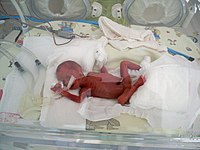
Photo from wikipedia
BACKGROUND AND OBJECTIVES Fast feed advancement may reduce hospital stay and infection but may increase adverse outcomes in preterm and low birth weight infants. The objective of this study was… Click to show full abstract
BACKGROUND AND OBJECTIVES Fast feed advancement may reduce hospital stay and infection but may increase adverse outcomes in preterm and low birth weight infants. The objective of this study was to assess effects of fast feed advancement (≥30 ml/kg per day) compared with slow feed advancement (<30 ml/kg per day) in preterm and low birth weight infants. METHODS Data sources include Medline, Scopus, Web of Science, CINAHL, and Index Medicus through June 30, 2021. Randomized trials were selected. Primary outcomes were mortality, morbidity, growth, and neurodevelopment. Data were extracted and pooled using random-effects models. The Cochrane Risk of Bias 2 tool was used. RESULTS A total of 12 RCTs with 4291 participants were included. At discharge, there was moderate certainty evidence that fast advancement likely slightly reduces the risk of: mortality (relative risk [RR] 0.93, 95% confidence interval [95% CI] 0.73 to 1.18, I2 = 18%, 11 trials, 4132 participants); necrotizing enterocolitis (RR 0.89, 95% CI 0.68 to 1.15, I2 = 0%, 12 trials, 4291 participants); sepsis (RR 0.92, 95% CI 0.83 to 1.03, I2 = 0%, 9 trials, 3648 participants); and feed intolerance (RR 0.92, 95% CI 0.77 to 1.10, I2 = 0%, 8 trials, 1114 participants). Fast feed advancement may also reduce the risk of apnea (RR 0.72, 95% CI 0.47 to 1.12, I2 = 0%, low certainty, 2 trials, 153 participants). Fast feed advancement decreases time to regain birth weight (mean difference [MD] -3.69 days, 95% CI -4.44 to -2.95, I2 = 70%, high certainty, 6 trials, 993 participants,) and likely reduces the duration of hospitalization (MD -3.08 days, 95% CI -4.34 to -1.81, I2 = 77%, moderate certainty, 7 trials, 3864 participants). Limitations include heterogeneity between studies and small sample sizes. CONCLUSIONS Fast feed advancement reduces time to regain birth weight and likely reduces the length of hospital stay; it also likely reduces the risk of neonatal morbidity and mortality slightly. However, it may increase the risk of neurodevelopmental disability slightly. More studies are needed to understand the long-term effects of fast feed advancement.
Journal Title: Pediatrics
Year Published: 2022
Link to full text (if available)
Share on Social Media: Sign Up to like & get
recommendations!